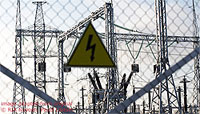Proposed Freeze on Utility Prices Seen as Politically Motivated

(Moscow Times – themoscowtimes.com – Alexander Panin – September 9, 2013) On the eve of elections, Prime Minister Dmitry Medvedev gave the government three days to prepare a feasibility study on how a possible freeze on natural monopolies’ prices next year might affect economic growth and business in general.
The Cabinet on Friday was ordered to evaluate by Monday the effect that the freeze on natural gas, electricity and rail transportation prices would have on the economy.
In June, the Economic Development Ministry presented the first draft of the proposal, which suggested that for 2014-15 natural monopoly price hikes should be limited to 5 percent per year, down from the previous 15 percent.
Moreover, at the Group of 20 summit held in St. Petersburg last week, the Finance Ministry supported the idea of suspending natural monopoly price hikes for a year.
“Companies should cut their expenditures. … We know that they have the necessary reserves and see the price freeze as a means to stimulate them to continue their structural reforms,” Finance Minister Anton Siluanov said, Itar-Tass reported.
But analysts were skeptical about the proposal, saying that the effect would be the opposite of what the authorities intended.
“We doubt that prices will be completely frozen, as this could lead to a significant reduction in natural monopolies’ investment programs,” Raiffeisenbank said in a report. The bank’s analysts suggested that price growth would be set at the same rate as inflation.
“The proposed scenario seems hard to believe. A gradual increase in prices is more likely,” said Alexander Kornilov, a senior oil and gas analyst at Alfa Bank.
He said Gazprom had a strong lobby in the government that had so far helped it to ensure steep price hikes to fund its investment program.
“If Gazprom’s prices were to freeze, the monopoly could react by re-evaluating its earlier investment commitments,” Kornilov said.
While putting a limit on price hikes would mean monopolies would not be able to complete their costly investment programs, this would also further slow down the economy, experts said.
“The economy is slowing down, and this has been a grave concern for the president and the Cabinet. Previously, a solution was seen in an increase in natural monopolies’ spending as large infrastructure projects, such as building pipelines, railroads and highways, could stimulate economic growth,” said Konstantin Simonov, head of the National Energy Security Fund.
But setting a limit on Gazprom’s prices, for instance, would mean that it would stop building pipelines, he said. And the same is true for the rail and electricity sector.
The only one who would win in the short run is the consumer, other experts said.
“A freeze on prices is good news for the consumers as their spending on utilities will stay at the current level. Also, if this decision is made, the rate of inflation next year could be less than expected,” said Dmitry Baranov, a senior analyst at Finam.
This is why the announced plans are politically motivated, Simonov said. And they are unlikely to be implemented.
“These are short-lived decisions. Natural monopoly prices are likely to be reconsidered several times, which is sad. This means that the government, instead of making long-term strategic plans, just takes the side of lobbyists who happen to be most convincing at the moment,” the expert said.
